Author(s) |
Title and Abstract |
Tang, H. H. H., Chong, K. M. E
& Yuen W. W. T.
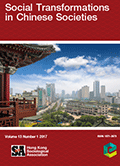 |
Learning to Understand a Nation: Developing a National Education Curriculum Imbued with Catholic Social Ethics for Hong Kong’s Primary Schools. Schools. Social Transformations in Chinese Societies, 15(2), 81-93.
Abstract:
Purpose National identification among young people and the issues about how national education should be conducted have been the significant topics when the Hong Kong Special Administrative Region was entering its third decade of the establishment. This paper was written based on data the authors obtained upon participation in a project organized by the Centre for Catholic Studies of the Chinese University of Hong Kong. The project was carried out after the official curriculum, known as the Moral and National Education Curriculum Guide, was shelved due to popular resentment. The project aimed at capturing the timely opportunity for substantial resources available for school-based operation of moral and national education and developing an alternative curriculum about teaching national issues and identification for Catholic Diocese and Convent primary schools to adopt. This paper aims to investigate the nature of this Catholic Project and examines the extent to which it is a counterhegemonic project or one for teaching to belong to a nation (Mathews, Ma and Lui, 2007). It assesses the project’s possible contribution to citizenship and national education in Hong Kong, since the withdrawal of the Moral and National Education Curriculum Guide.
Design/methodology/approach The authors of this paper worked in an education university of Hong Kong and were invited to be team members of this Catholic Project. The role comprised proposing topics for teacher training, conducting seminars, giving comments to teaching resources, observing and giving feedback to schools that tried out the teaching and designing/implementing an evaluative survey and conducting follow-up interviews with involved parties such as teachers and key officials of the Catholic Centre. Given this, the research involved can be perceived as action research. This paper was written up with both the qualitative and quantitative data the authors collected when working the project.
Findings This paper reported a Catholic citizenship training project with the focus on a Catholic school project on preparing students to understand the nation by learning national issues analytically. The ultimate goal was to ensure teachers in Catholic primary schools could lead the students to examine national issues and other social issues from the perspective of Catholic social ethics. Though the project arose after the failure of the government to force through its controversial national education programme, this paper found that instead of being an alternative curriculum with resistance flavour, the project was basically a self-perfection programme for the Catholic. It was to fill a shortfall observed of Catholic schools, namely, not doing enough to let students examine social and national issues with Catholic social ethics, which, indeed, had a good interface with many cherished universal values. In the final analysis, the project is not a typical national education programme, which teaches students to belong to a nation but an innovative alternative curriculum transcending the hegemony-resistance ideological tensions as advanced by western literature (for example, Gramsci, 1971; Freire, 1970; and Apple, 1993).
Originality/value The paper contributes to the literature of Hong Kong studies and citizenship education studies. The results of such an innovative endeavour, which captures and capitalizes the opportunity and resources for developing a national education curriculum in school-based manner. Attention was paid to the endeavour’s nature and its possible contribution to the knowledge, policies and practices of citizenship and national education in Hong Kong amidst deep social transformations. In particular, the paper can add to the specific literature about Hong Kong’s citizenship and national education development since the withdrawal of the Moral and National Education Curriculum Guide. Using an empirical example of Asian schooling and society, analysis of this paper illustrates the way in which development of an alternative curriculum is more innovative and interesting, transcending the hegemony-resistance ideological tensions.
Keywords: National Education, Alternativen Curriculum, Catholic Primary Schools, Catholic Social Ethics, Hong Kong Citizenship Education |
Cheng, E. C. K., Yuen, T. W. W., Leung, Y. W., & Tang, H. H. H.
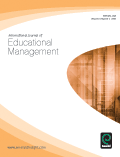 |
A Model for Promoting Student Participation in School Governance. J. International Journal of Educational Management, online publication. https://doi.org/10.1080/1360080X.2019.1687268.
Abstract:
Purpose The purpose of this paper is to highlight the urgent need for a genuinely effective and attainable citizenship education model in Hong Kong’s schools, which focusses on promoting student participation in school governance. It is an empirical citizenship education management model for school leaders that illustrates the predictive effects of personally responsible, participatory, justice-oriented and patriotic citizenship, necessarily supported by school management practices, school ethos and teacher beliefs. Design/methodology/approach A total of 3,209 students from 51 secondary schools in Hong Kong participated in a quasi-experimental design questionnaire survey. A structural equation model (SEM) was applied to confirm the model.
Findings The results of the SEM show that the values and cultural practices held by a school’s teachers drive the implementation of its citizenship education. Moreover, it is well known that organizational values can exert a powerful influence and it is the same within educational structures: management practices in schools have an impact on ethos, teachers’ beliefs and student participation in school governance.
Practical implications The paper provides practical proposals for school leaders to create opportunities for student participation in school governance. Originality/value This study builds on existing literature and provides school leaders with a practical model for implementing student participation in school governance.
Keywords: Civic Education, Student Partricipation, School Governance, Hong Kong Schools, School Mission |
Choi, T-H, & Adamson, B.
 |
Rethinking ESOL/EAL professionalism with the growth in educational outsourcing. English as an Additional Language (EAL) Journal, 10, 27-29.
Abstract:
This article draws attention to the need to reconceptualise professionalism of teachers who teach English for Speakers of Other Languages (ESOL) [1], against the new development of educational outsourcing in public schooling. Since the 1970s, changes such as privatisation, marketisation, and deregulation have become a normal part of education in many parts of the world, including England. For instance, academisation of state schools started in the year 2000 with the expectation that removing local authority control over underperforming schools and allowing for private sponsorship would improve the efficiency of the public schooling system. Sponsorship was seen as a source of innovation and financial support. Academisation was accelerated during the Conservative-Liberal Coalition government between 2010 and 2015. From 2010 schools found to be 'inadequate' were forced to become academies. Despite the sponsorship from the private sector, the government still paid academic trusts up to £150,000 per school to assist conversion (for further discussion on global educational outsourcing including academisation and related issues, see Bates, Choi and Kim, 2019). One change along the way, educational outsourcing, reaches the core of schooling, that is, teaching and learning. Some academies in the UK, for instance, have purchased ready-made curricula from the US. Such educational outsourcing has raised concerns, which have not yet received due attention. It is in this context that I conducted my research in Hong Kong, where privatisation in education is a normal and prevalent phenomenon. Although this article thus mainly discusses the case of Hong Kong, it also draws on my ongoing research work undertaken elsewhere. |
Karakus, M.,
Toprak, M.,
& Chen, J.
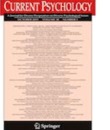 |
Teachers’ attitudes towards their school managers and their intent to leave: A gender-moderated model. Current Psychology.
http://doi.org/10.1007/s12144-019-00537-x
Abstract:
This study seeks to investigate the moderating role of gender on the relationships among teachers’ tenure, perceived managerial justice (PMJ), perceived managerial support (PMS), their trust in manager, commitment to manager, and intent-to-leave in an educational context. Collected from a sample of 430 primary school teachers in Turkey, data were analyzed through multiple-group structural equation modeling. Results showed that gender is a moderator in the relationships among tenure, commitment to manager, and perceived managerial justice. Gender also moderates the relationships between PMJ and commitment to manager, PMS, and commitment to manager, PMS and intent-to-leave, and trust and intent-to-leave. Gender effects call for a gender-tuned approach to organizational behaviour in schools and an alignment of leadership practices with this gender-differentiated approach. This study contributes to the current evidence by analyzing gender-specific perceptions on various organizational concepts in a single study and by looking at these concepts from a context where women’s participation in the labor force and their formal schooling rate is relatively low.
Keywords: Managerial justice Managerial support Trust Commitment Intent-to-leave Gender |
Tang, H. H. H., &
Chau, C. F. W.
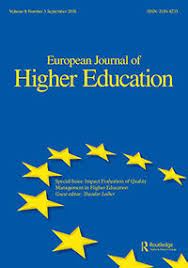 |
Knowledge exchange in a global city: A typology of universities and institutional analysis. European Journal of Higher Education. https://doi.org/10.1080/21568235.2019.1694424
Abstract:
In the existing literature of knowledge exchange (KE) and higher education, there is limited but emerging cluster of research which undertakes a comprehensive analysis of various types of higher education institutions and patterns of KE engagement. Employing the empirical example of Hong Kong, this paper examines the interconnections between institutional types and patterns of knowledge exchange (KE) activities in the context of a global city. It found that during the short history of KE policies and activities, all public universities in Hong Kong have been building their capacities for this new intellectual premise in the last decade. Meanwhile, disciplinary comprehensiveness and research/education intensity of the universities affect their institutional responses to the global trend of KE. The typology of higher education institutions suggested by this paper puts forward a perspective to further understand the institutional patterns of KE in the twenty-first century. |
Ho, C. M., & Lu, J.

|
School competition in Hong Kong: A battle of lifting school academic performance? International Journal of Educational Management. 33(7), 1483-1500. https://doi.org/10.1108/IJEM-07-2018-0201
Abstract:
Under-examination of the notion of competition between schools has created a considerable asymmetry between the reality and the literature of schooling. Therefore, this study investigates the validity of school competition and verifies the propositions regarding the effects of school marketing practices in literature, particularly DSS and aided schools in Hong Kong. It tests the relationships between student intake and school academic performance and school marketing practices. It also compares the pattern of the relationships between the Direct Subsidy Scheme (DSS) and aided secondary schools. Secondary data from 441 secondary schools were retrieved from a popular secondary school admission magazine in Hong Kong and from the schools’ websites. Hierarchical regression analysis revealed that the school’s academic performance was positively related to discretionary student intake. In addition, marketing school academic performance, but not marketing school features, was positively related to student intake. Lastly, it was found that marketing school academic performance intensified the relationship between the school’s academic performance and student intake in aided schools but not in DSS schools. The results were interpreted as demonstrating that school competition in Hong Kong is a battle of lifting academic performance. |
Qian, H. Y.,
& Walker, A.
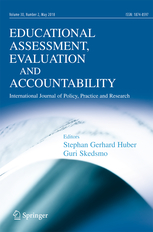
|
Reconciling top-down policy intent with internal accountability: the role of Chinese school principal. Educational Assessment, Evaluation and Accountability. https://link.springer.com/article/10.1007/s11092-019-09309-4
Abstract:
The purpose of this paper is to explore the role school principals play in managing the intersection of external and internal accountability systems within Chinese schools. Specifically, the paper seeks to understand principals’ perception of top-down account- ability demands and the strategies they adopt to build and strengthen internal account- ability while responding to external demands. The data was drawn from in-depth interviews with primary school principals across six regions. The study suggests that a complex mix of leadership practices defines school principalship in China. On the one hand, their work environment seems to be highly political and they must be conscious of their role as state employees. On the other hand, there is a strong professional expectation of school principals and they must gain legitimacy by demonstrating expert knowledge in curricula and instruction and by approaching teachers in a way that combines sincerity and benevolence. This emphasis on relationship building may help to advance theoretical understandings of leadership in the face of accountability demands.
Keywords: School principalship, Accountability, China.Instructional leadership. |
Poudel, P. P.
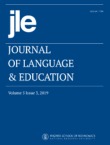 |
Medium of Instruction (MOI) policy in Nepal: towards a critical engagement in ideological and pedagogical debate. Journal of Language and Education. 5(3), 102-110. https://doi.org/10.17323/jle.2019.8995
Abstract:
Although there were attempts at materializing the multilingual and multicultural education in Nepal, changes have remained more discursive than pragmatic at the real ground. Problems discussed have remained unsolved. The issues of protection and promotion of the historically residing linguistic diversity have been addressed through the current constitution (Constitution of Nepal-2015) which provides an appropriate legal framework for substantive legal protection for the national indigenous languages as MOI. However, successful implementation of this provision is further complicated due to the global political economy, interdependence and ‘sandwiched’ geopolitical status of Nepal. Doubts prevail on potential fine-tuning of the MOI in reality in line with the imagined ideologies in the policy documents. As it has been noted that education policymaking is highly centralized and implementation is top-down (Edwards, 2011) in Nepal, the current trend of English medium instruction supported by parents, communities and private sector from bottom-up will further weaken the attempts for the mother tongue MOI in Nepalese schools. And this trend will ultimately threaten the existing linguistic diversities and ecologies. Moreover, the social capitalization of English from the bottom-up will be strengthened, though consequences are obviously dismal but essentialist. Despite the research findings revealing that multilingual education offers the best possibilities for preparing the coming generation to participate in constructing more equitable and democratic societies in the globalized world, translation of such findings into real-life practice is telescopic. Hence, critical engagement of the scholars, educators, investors, and policymakers in order to develop contextually realistic and bottom-up policymaking is urgent for sustainable and efficient MOI policymaking that justifies the use of mother tongues, national language and the global language in an integrated framework sufficiently enough for the future generation to compete locally and globally.
|
Poudel, P. P.
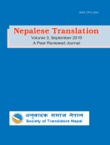 |
Translation as a social equalizer in the super-diverse contexts. Nepalese Translation. 3, 57-63.
Abstract:
Translation has been a customary activity in the globalized marketplaces. It has been established as a worldwide necessity due to the emergence of increasingly super-diverse social contexts. In such contexts, it has been operational as the most effective strategy in shaping global communications and associated complexities related to both cultural and linguistic aspects. This role of translation termed here as “social equalizer”, is a political notion. While discussing this concern, I have critically reflected on my own everyday experiences since I often encounter instant translation while making intercultural and inter-linguistic communication. As well, I have also reflected my experience associated with globalization, linguistic diversity, and translation engineering. Therefore, this reflective paper highlights the rationale of translation as a social equalizer within the contexts of political, economic, social and linguistic diversities in the contemporary world.
|
Szeto, E.,
Cheng, A. Y. N.,
& Sin, K. F.
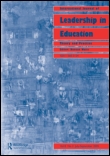
|
Challenges of difference and difficulty: how do principals enact different leadership for diverse student population in a changing Chinese school context? International Journal of Leadership in Education. 22(5), 519-535. https://doi.org/10.1080/13603124.2018.1518541
Abstract:
Little research has been conducted to gain deeper understandings of policy change of piloting special educational need coordinators (SENCO) in a Chinese education community. In response to the change in policy towards regularisation of the SENCO, we examined a trajectory of policymaking for SEN support in Hong Kong’s integrated education. Critical discourse analysis as a discursive method of analysing the local SEN practices in relation to the international policy development was adopted. The key questions are: What is the difference between this Chinese integrated education and international policy development for inclusion? What effects of the pilot SENCO have emerged in the policy and media texts in the Chinese integrated education? What recommendations can be derived to inform the regularisation of SENCOs in ordinary public schools? The findings shed light on the conceptual discrepancy between integrated and inclusive education in the policymaking. The economic considerations and administration accountability of the pilot SENCO affected the regularisation. As reflected in this Chinese integrated education, we also discuss the implications of changing the SENCO policy for quality SEN support in schools. |
Chen, J.
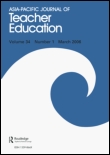 |
Teacher emotions in Chinese primary schools: Implications for teacher development. Asia-Pacific Journal of Teacher Education. https://doi.org/10.1080/1359866X.2019.1669139
Abstract:
This study aimed at understanding teacher emotions through interviewing 25 and surveying 1,492 primary teachers in China using a mixed method. Content analysis was employed to analyse the data using the five nested ecological systems – microsystem, mesosystem, exosystem, macro-system, and chronosystem. Statistical techniques such as mean score, Multivariate analysis of variance, Univariate analysis, and effect size were used to deal with the quantitative data. Qualitative results show that 25 teachers described 65 emotions including 33 positive and 32 negative emotions. The number of emotions that teachers reported decreased as the distance from the teachers increased. The quantitative survey comprised 14 positive and 17 negative emotion items. Given the powerful role that emotions and relationships play in education, the discussion was made with regard to classroom management, emotional display rules, and teacher vulnerability. The implications for teacher development and well-being were provided accordingly.
Abbreviations: MANOVA; ANOVA
Keywords: Teacher emotion, Chinese education, teacher education, mixed method |
Wang, M., & Ho, D.
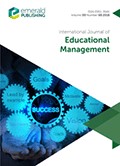 |
A quest for teacher leadership in the twenty-first century–emerging themes for future research. International Journal of Educational Management. https://doi.org/10.1108/IJEM-01-2019-0038
Abstract:
Purpose – The purpose of this paper is to provide a research synthesis of findings drawn from studies of teacher leadership published in English-based journals from 2000 to 2018. The goal of the research synthesis was to develop new insights into teacher leadership through a theoretical discussion and to identify emerging themes for future research.
Design/methodology/approach – The methodology employed in this study was systematic review. The study first identifies a body of relevant literature and research on teacher leadership from the English-based journals from 2000 to 2018. Information concerning the nature of the studies as well as substantive findings was extracted from each of the articles. Synthesis of findings was accomplished by identifying key themes in the literature.
Findings – The synthesis yielded four themes: “the notion of teacher leadership,” “the theoretical perspectives are used for understanding teacher leadership,” “the factors are influencing the development of teacher leadership,” and “the approach to build and develop leadership capacity.”
Originality/value – This paper attempts to offer a critical review on the current literature and research on teacher leadership, reveal if there are any gaps in the ongoing debate, and identify the agenda for future research. This paper not only explores “what there is,” but also examines “what is missing,” and “what could be improved upon” by reviewing research findings that emerged in the teacher leadership literature produced from 2000 to 2018. The paper could shed light on the existing research about teacher leadership.
Keywords – Teacher leadership, Capacity Building, Leadership Preparation, Teacher Agency, Teacher Leader
|
King, R. B.,
& Chen, J.
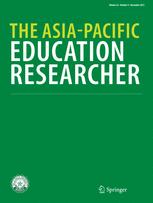 |
Emotions in education: asian insights on the role of emotions in learning and teaching. The Asia-Pacific Education Researcher, 28(4), 279-281.https://doi.org/10.1007/s40299-019-00469-x |
Chen, J.

|
Efficacious and positive teachers achieve more: examining the relationship between teacher efficacy, emotions, and their practicum performance. The Asia-Pacific Education Researcher, 28(4), 327-337. https://doi.org/10.1007/s40299-018-0427-9
Abstract:
This study will examine the relationship between pre-service teachers’ efficacy, emotion, and practicum performance score. A sample of 963 pre-service teachers was approached from four universities in China. This study used two self-reported instruments (The Teachers’ Sense of Efficacy Scale and the Teacher Emotion Inventory) and the participants’ practicum performance scores to test the relationship. Data were dealt using exploratory factor analysis, confirmatory factor analysis, and structural equation modelling. As expected, the structural model generally shows that pre-service teachers’ efficacy significantly predicts their practicum performance through their emotions. Teachers with a higher level of efficacy on Instructional Strategies positively predict their practicum performance through more pleasant emotions such as Love and Joy. By contrast, pre-service teachers with a lower level of confidence of Student Engagement tend to experience more unpleasant emotions (e.g. Fear, Sadness, and Anger) and gain lower practicum performance. One interesting link identified is between the efficacy factor Classroom Management and negative emotion Sadness. On the top of these, three emotion dimensions had been identified to relate to their practicum scores, that is, Joy, Love and Anger. The findings concerning the three constructs can provide a new perspective for teacher effectiveness research by taking teacher emotion and efficacy into account.
|
Lu, J.
 |
Reciprocal gain spirals: The relationships among sleep quality, work enjoyment, cooperative interaction, and work passion of teacher leaders. The Asia-Pacific Education Researcher, 28(4), 353-361. https://doi.org/10.1007/s40299-018-00430-4
Abstract:
Despite the crucial importance of teacher impact for a wide range of student and teacher outcomes, it is not clear whether any individual-level factors precede teacher passion and if so how. Drawing on self-regulation theory and the self-regulatory strength model, I propose a theoretical reciprocal model in which teachers’ sleep quality predicts their work enjoyment and engagement in cooperative interaction with others in school, both of which lead to greater work passion. In turn, higher levels of work passion have a reciprocal effect on the teachers’ sleep quality. The model is tested using experience sampling method (ESM) data collected from 137 teacher leaders in Hong Kong and 79 teacher leaders in Shanghai. Teacher leaders responded to short ESM questionnaires three times a day for ten consecutive working days. The results of cross-lagged path analysis support the hypothetical model. The results are interpreted as that nurturing teacher passion is partly a within-person process; teachers’ passion can stem from their own work enjoyment and positive interaction with others in schools, for both of which good quality sleep is helpful.
|
Yu, B., Vyas, L.,
& Wright, E.
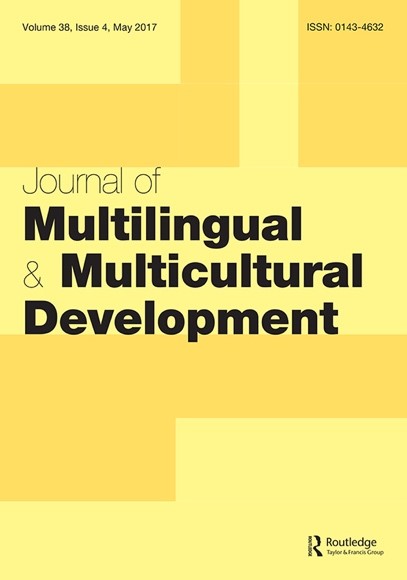 |
Crosscultural transitions in a bilingual context: The interplays between bilingual, individual and interpersonal factors and adaptation. Journal of Multilingual and Multicultural Development. https://doi.org/10.1080/01434632.2019.1623224
Abstract:
As a regional hub for education, Hong Kong has seen a growing population of international students. In contrast to existing conceptual models in acculturation literature that are typically devoted to studying long-term settlers such as migrants or refugees in English speaking countries, this study develops and tests a fine-grained model for degree-seeking mobile students in East Asia. A mixed-method study was conducted: a survey of 619 international students across six Hong Kong universities and focus group interviews with 22 Asian and nine non-Asian students. Bilingual competences were found to play significant roles in predicting sociocultural adaptation together with academic efficacy, social support, contact with locals, and psychological adaptation. This study offers practical and managerial insights for educational policymakers, university senior management and administrations, academicians, and research communities on how to manage the expansion and accommodate the needs of international students so that we can cater for a culturally diverse body of students. This research is significant because it extends the literature by examining sociocultural adjustment during crosscultural transitions in the increasingly globalised context of Hong Kong.
Entitled “Sociology of Education and Society in Hong Kong: In Retrospect and Prospects,” this special issue is co-edited by Drs Hei-hang Hayes Tang of the Education University of Hong Kong and Kwok Kuen Tsang of Beijing Normal University and me. The aim of the special issue is to critically discuss and review the roles of sociological theories and perspectives in understanding the current educational issues and/ or phenomena in Hong Kong.
|
Chen, J.
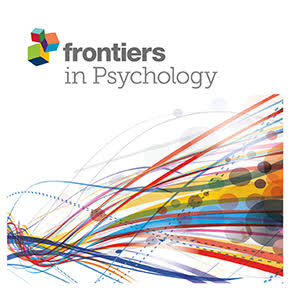 |
Research review on teacher emotion in Asia between 1988 and 2017: Research topics, research types and research methods. Frontiers in Psychology. doi: 10.3389/fpsyg.2019.01628
Abstract:
Background. Studies on teacher emotion have steadily become more prominent. However, it has been observed that scholarship on teacher emotion has been dominated by contributions from Western societies. In the absence of a critical mass of empirical research generated from within the region such as Asia, lack of knowledge and capacity to inform policy and practice in teacher education and evaluation mechanism.
Methods. The current study sought to mirror the patterns of knowledge production in teacher emotion in terms of research topics, types and methods and how they have evolved over time in Asia between 1989 and 2018. By using a descriptive quantitative analysis approach, we review a corpus of 154 articles on teacher emotion published in peer-review journals in Asia. It began with a systematic search in seven widely used electronic databases for abstracts of potentially relevant studies.
Results. As observed, the trend represents a sea change in the volume of publications in Asia although the overall volume of research is still relatively low. Results also identify that although quantitative methods were most commonly used, the findings reveal a more balanced distribution since 1993. Furthermore, the use of qualitative and mixed methods of research has undergone a marked increase in the past ten years. However, as the majority of articles were exploratory-oriented, intervention and experimental studies were largely lacking, which resulted in the ‘so-what’ story being missing.
Conclusions. A functionalist perspective suggests that knowledge production in teacher emotion research in Asia is either at the late first stage or the emerging second stage. Recommendations have been provided based on the major results and challenges.
|
Tang, H. H. H.
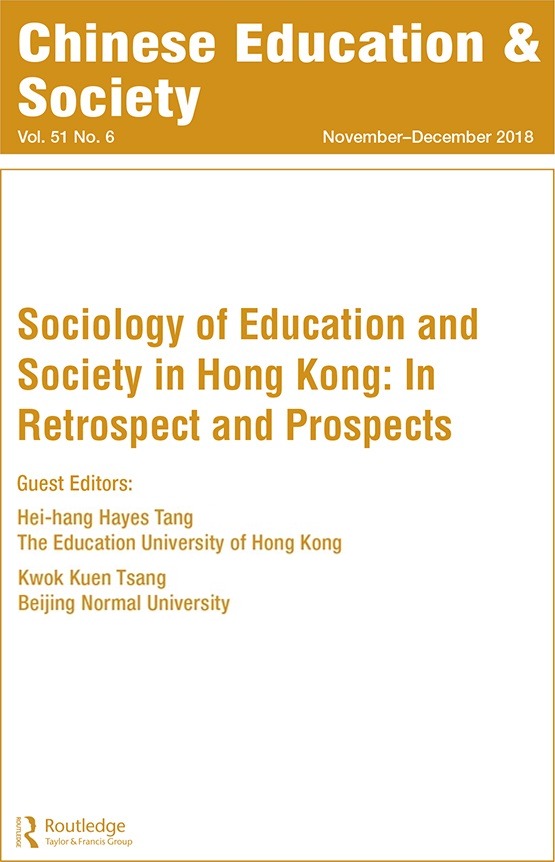 |
Sociology of education and its forms of scholarship: Taking stock, looking ahead in China's Hong Kong amidst deep transformation. Chinese Education and Society, 51(6), 427-430.
Abstract:
As a member of the Chinese community at large, Hong Kong represents a “social laboratory” where any imposed exchange of powers usually stimulates recurrent repercussions in many aspects (Chan and Lee 2007). However, surveying the related bodies of academic literature reveals that most sociological works pay less attention to the phenomena related to Hong Kong education and society, in comparison with those phenomena that happened in other Chinese societies, especially mainland China. The empirical patterns by no means imply that the sociological understanding about Hong Kong education is less significant. The role of sociology of education, as in other Chinese societies, should contribute to a better understanding about the relationship between education, society, and Chineseness. The sociological investigation of Hong Kong education and society has more than 50 years of history. However, there is not much effort to synthesize the knowledge. The scholarship of integration is important since it can tell us about what happened, is happening, and the way forward in Hong Kong sociology of education as an academic field. It will offer an integrated framework that helps sociologists and educational researchers to better understand and conceptualize the changing conditions, emerging issues, and prospective trends in Hong Kong education and society, with theoretical and methodological implications for sociological studies into education and other Chinese communities.
Entitled “Sociology of Education and Society in Hong Kong: In Retrospect and Prospects,” this special issue is co-edited by Drs Hei-hang Hayes Tang of the Education University of Hong Kong and Kwok Kuen Tsang of Beijing Normal University and me. The aim of the special issue is to critically discuss and review the roles of sociological theories and perspectives in understanding the current educational issues and/ or phenomena in Hong Kong.
|
Tang, H. H. H., Chong, K. M. E, & Yuen W. W. T.
 |
Learning to understand a nation: Developing a national education curriculum imbued with catholic social ethics for Hong Kong’s primary schools. Social Transformations in Chinese Societies. https://www.emerald.com/insight/content/doi/10.1108/STICS-10-2018-0015/full/html
Abstract:
Purpose National identification among young people and the issues about how national education should be conducted have been the significant topics when the Hong Kong Special Administrative Region was entering its third decade of the establishment. This paper was written based on data the authors obtained upon participation in a project organized by the Centre for Catholic Studies of the Chinese University of Hong Kong. The project was carried out after the official curriculum, known as the Moral and National Education Curriculum Guide, was shelved due to popular resentment. The project aimed at capturing the timely opportunity for substantial resources available for school-based operation of moral and national education and developing an alternative curriculum about teaching national issues and identification for Catholic Diocese and Convent primary schools to adopt. This paper aims to investigate the nature of this Catholic Project and examines the extent to which it is a counterhegemonic project or one for teaching to belong to a nation (Mathews, Ma and Lui, 2007). It assesses the project’s possible contribution to citizenship and national education in Hong Kong, since the withdrawal of the Moral and National Education Curriculum Guide.
Design/methodology/approach The authors of this paper worked in an education university of Hong Kong and were invited to be team members of this Catholic Project. The role comprised proposing topics for teacher training, conducting seminars, giving comments to teaching resources, observing and giving feedback to schools that tried out the teaching and designing/implementing an evaluative survey and conducting follow-up interviews with involved parties such as teachers and key officials of the Catholic Centre. Given this, the research involved can be perceived as action research. This paper was written up with both the qualitative and quantitative data the authors collected when working the project.
Findings This paper reported a Catholic citizenship training project with the focus on a Catholic school project on preparing students to understand the nation by learning national issues analytically. The ultimate goal was to ensure teachers in Catholic primary schools could lead the students to examine national issues and other social issues from the perspective of Catholic social ethics. Though the project arose after the failure of the government to force through its controversial national education programme, this paper found that instead of being an alternative curriculum with resistance flavour, the project was basically a self-perfection programme for the Catholic. It was to fill a shortfall observed of Catholic schools, namely, not doing enough to let students examine social and national issues with Catholic social ethics, which, indeed, had a good interface with many cherished universal values. In the final analysis, the project is not a typical national education programme, which teaches students to belong to a nation but an innovative alternative curriculum transcending the hegemony-resistance ideological tensions as advanced by western literature (for example, Gramsci, 1971; Freire, 1970; and Apple, 1993).
|
Lo, L. N. K.
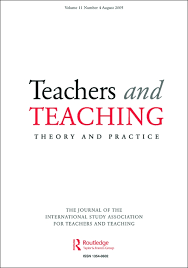
|
Teachers and teaching in China: A critical reflection. Teacher and Teaching: Theory and Practice. https://doi.org/10.1080/13540602.2019.1632823
Abstract:
This article offers a critical review of the impact of policy-induced changes on school teachers in the Chinese Mainland where educational reform has been an ongoing project for four decades. It addresses three aspects of the current state of teaching and the teaching profession: the contextual factors that have influenced their development; the state policies that effected the teachers; and the lessons that can be drawn from the reform experiences of the teachers. By examining the changes that have occurred in curriculum and teaching, teacher preparation and training, and teacher professionalism and leadership, this paper argues for a more inclusive approach to policy formulation and implementation that can accommodate the needs of frontline teachers serving in the diverse educational settings of Chinese schooling. |
Chen, J., & Teo, T.
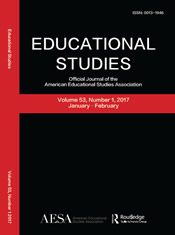
|
Chinese school teachers' conceptions of high-stakes and low-stakes assessments: An invariance analysis. Educational Studies. doi. 10.1080/03055698.2019.1599823.
Abstract:
The study investigated teachers’ conceptions of high-stakes and low-stakes assessments with a sample of 1,013 school teachers from China. In general, the assessment model indicated that school teachers in this study agreed with the most factors. They demonstrated a broad understanding of the improvement, evaluation, control, irrelevance, and challenges of assessment for a range of purposes. Multi-group confirmatory factor analysis for high-stakes vs low-stakes found that Chinese teachers perceived improvement, school accountability and examination purposes as highly positively correlated, though accountability was weakly correlated with irrelevance. Further, these teachers showed favourable attitudes toward low-stakes assessments which are believed more indicative of learning, teaching, examination, and school accountability. These results indicate that it is an appropriate option to adopt low-stakes assessments to remedy the unintended effects of high-stakes assessments in China. Possible explanations for major results are discussed, which may provide implications for other educational contexts.
|
Chen, J.
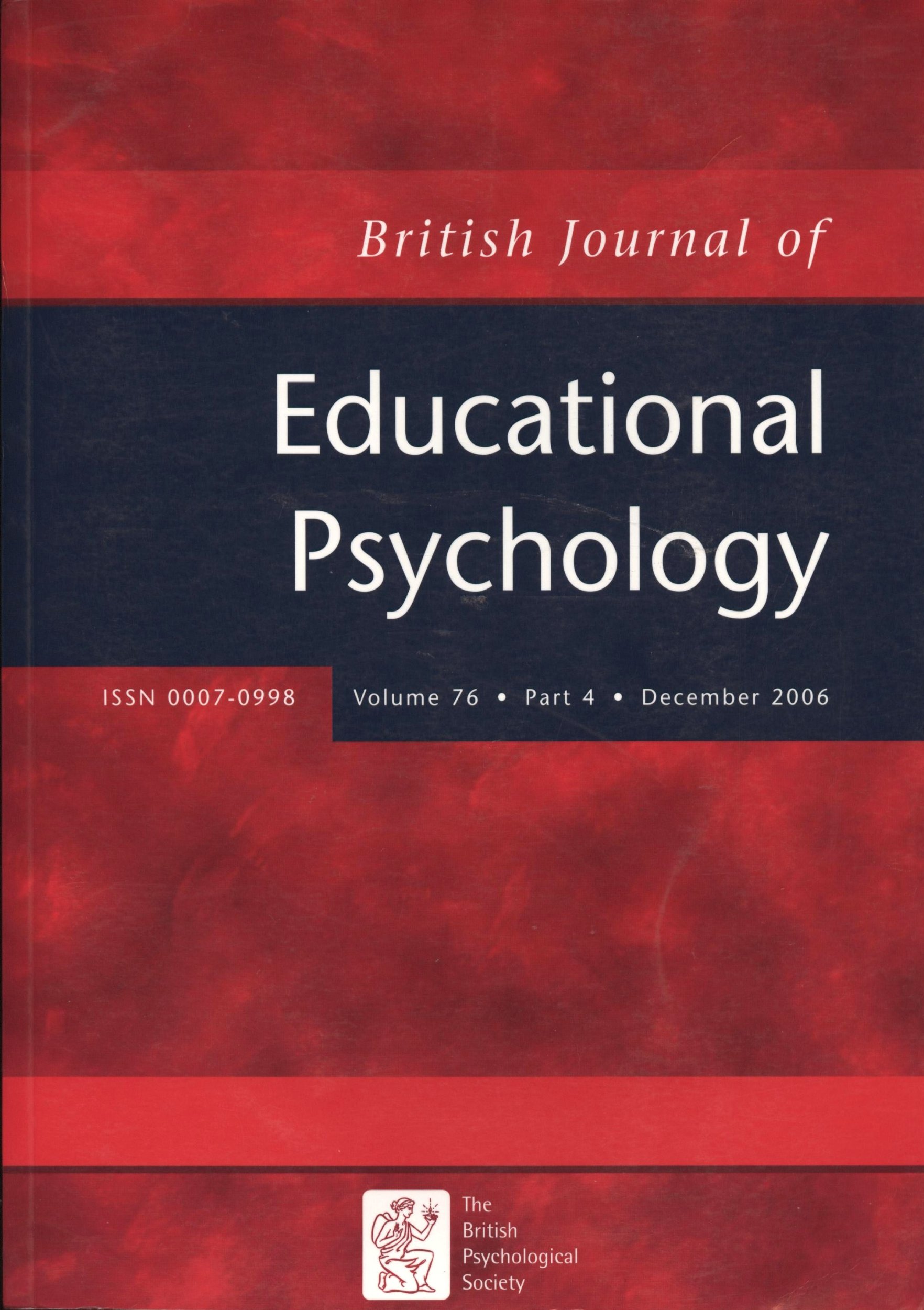 |
Exploring the impact of teacher emotions on their approaches to teaching: A structural equation modelling approach. British Journal of Educational Psychology, 89(1), 57-74. https://doi.org/10.1111/bjep.12220
Abstract:
Background – Research into teacher emotion has attracted increasing attention in the last two decades. The relevance of teacher emotion in education has been highlighted. However, evidence of how teacher emotions impact their teaching approaches is rather limited.
Aims – This study investigated the relationship between two self‐report instruments – the Teacher Emotion Inventory and the Approach to Teaching.
Sample – There were 1,830 teachers were approached from 43 primary schools in China and 12 primary schools in Hong Kong.
Methods – Exploratory factor analysis, confirmatory factor analysis, and structural equation modelling were utilized in the analysis procedure.
Results – As a result, a five‐factor TEI model was identified with two positive factors (Joy and Love) and three negative factors (Sadness, Anger, and Fear). A ATI model involved was confirmed with three factors (Knowledge Transmission, Student‐Teacher Interaction, and Student Focus). Structural equation modelling demonstrated that more student‐centred approaches are the consequence of positive teacher emotions while a teacher‐centred approach is the consequence of negative teacher emotions although there are two surprising links.
Conclusions – Identifying this pattern of relationships will contribute to understanding the reasons why new teaching strategies are often not adopted despite well‐designed professional programs and educational reform and will provide implications for teaching improvement through teacher emotion.
|
Liu, C., Chung, K. K. H., Fung, W. K.
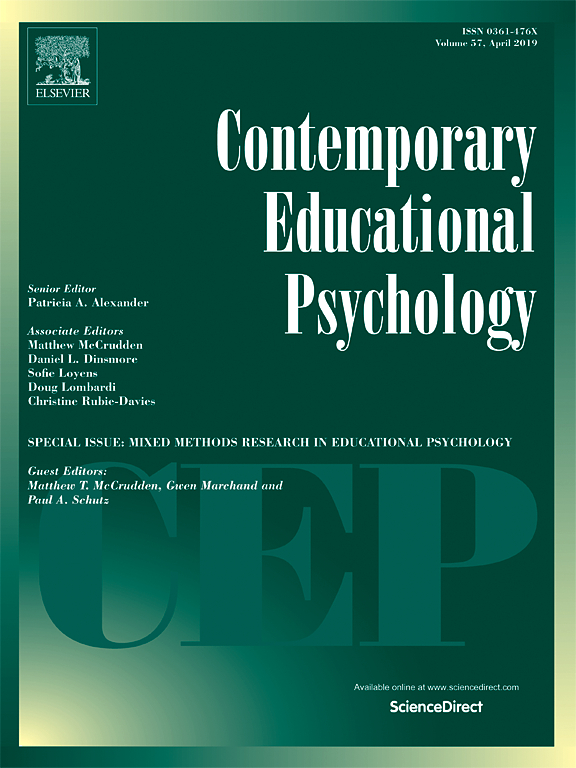 |
Bidirectional relationships between children’s executive functioning, visual skills, and word reading ability during the transition from kindergarten to primary school. Contemporary Educational Psychology, 59, 101779. https://doi.org/10.1016/j.cedpsych.2019.101779
Abstract:
This longitudinal study investigated the bidirectional relationships between executive functioning (EF), visual skills, Chinese and English word reading abilities in children transitioning to primary school. A total of 165 children in Hong Kong were followed from the third year of kindergarten (Time 1) (mean age: 62.80 months, SD: 3.74) to the first year of primary school (Time 2) (mean age: 77.25 months, SD: 4.60). Assessments for measuring EF, visual skills, phonological awareness, morphological awareness, and Chinese and English word reading were administered to the children at the two time points. Results of cross-lagged panel analyses revealed that after age, phonological awareness, and morphological awareness were controlled, EF and visual skills exhibited a bidirectional relationship. Furthermore, EF and word reading in Chinese or English reciprocally predicted each other during the school transition period after other skills were controlled. However, visual skills and word reading in Chinese or English did not predict each other. These findings highlight the close associations between EF and visual skills as well as the importance of EF in learning to read Chinese and English in kindergarten and early primary school.
|
Bates, A.,
Choi, T. H.,
& Kim, Y.
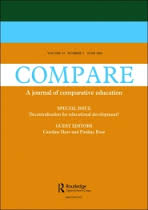
|
Outsourcing education services in South Korea, England and Hong Kong: A discursive institutionalist analysis. Compare: A Journal of Comparative and International Education, 51(2), 259-277. https://doi.org/10.1080/03057925.2019.1614431
Abstract:
The outsourcing of education services has been widely adopted across international contexts as a ‘tested solution’ or panacea to meet various educational problems including school management, curriculum design, teaching and student discipline. Contracting third-party providers, it is argued, enhances organisational goals such as efficiency, quality and school improvement. However, the outsourcing of education services has also impacted on established notions concerning the boundaries around teachers’ work. This paper deploys the framework of discursive institutionalism to offer insight into how the idea of outsourcing has been activated and circulated by discursive communities in three diverse international settings. Despite its problem-solution logic, the institutionalisation of outsourcing creates its own problems, not least the undermining of teacher professionalism, the ‘businessification’ of schools and a diminishing of their educational mission. |
Xiong, X. B.,
Lim, C. P.,
& Liu, S. Q.
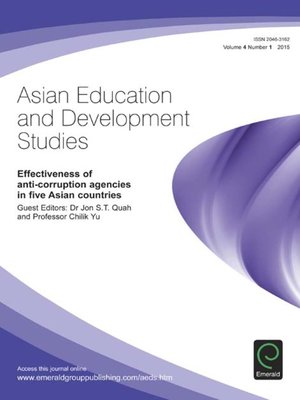 |
Curriculum leadership and the enhancement of teacher education programs: A case study in a Mainland Chinese normal university. Asian Education and Development Studies. https://doi.org/10.1108/AEDS-12-2018-0181
Abstract:
Purpose – Teacher education programmes are critical in developing pre-service teachers’ competencies during the apprenticeship phase (Lim et al., 2010), whereas there is evidence indicating that teacher education programmes depend on curriculum leadership (Robinson et al., 2008). The purpose of this paper is to explore the ways in which curriculum leaders enact their curriculum leadership to enhance teacher education programmes in a context of a normal university in Mainland China.
Design/methodology/approach – In this paper, three groups of curriculum leaders, from university, faculty and classroom level, respectively, are interviewed.
Findings – This study highlights the significance of curriculum leadership in teacher education programmes enhancement in China, particularly the significant impacts from curriculum leaders’ involvement on the programme processes of planning, implementation and evaluation.
Research limitations/implications – Implications for research include a conceptualization of curriculum leadership in teacher education and pre-service teachers’ training in China, and a theoretical integration of curriculum leadership and the enhancement of teacher education programmes.
Originality/value – Implications for practice regard to restructuring curriculum leadership system and informing curriculum leadership practices, not only in Asian countries, but might be able to shed light on the curriculum leadership development in a range of educational contexts either similar to or different from that of Mainland China. This study thus would contribute to several areas of research.
|
Chen, J.,
& Teo, T.
 |
Chinese school teachers’ conceptions of high-stakes and low-stakes assessments: An invariance analysis. Educational Studies. https://doi.org/10.1080/03055698.2019.1599823
Abstract:
The study investigated teachers’ conceptions of high-stakes and low-stakes assessments with a sample of 1,013 school teachers from China. In general, the assessment model indicated that school teachers in this study agreed with the most factors. They demonstrated a broad understanding of the improvement, evaluation, control, irrelevance, and challenges of assessment for a range of purposes. Multi-group confirmatory factor analysis for high-stakes vs low-stakes found that Chinese teachers perceived improvement, school accountability and examination purposes as highly positively correlated, though accountability was weakly correlated with irrelevance. Further, these teachers showed favourable attitudes toward low-stakes assessments which are believed more indicative of learning, teaching, examination, and school accountability. These results indicate that it is an appropriate option to adopt low-stakes assessments to remedy the unintended effects of high-stakes assessments in China. Possible explanations for major results are discussed, which may provide implications for other educational contexts.
|
Wright, E.,
& Lee, M.
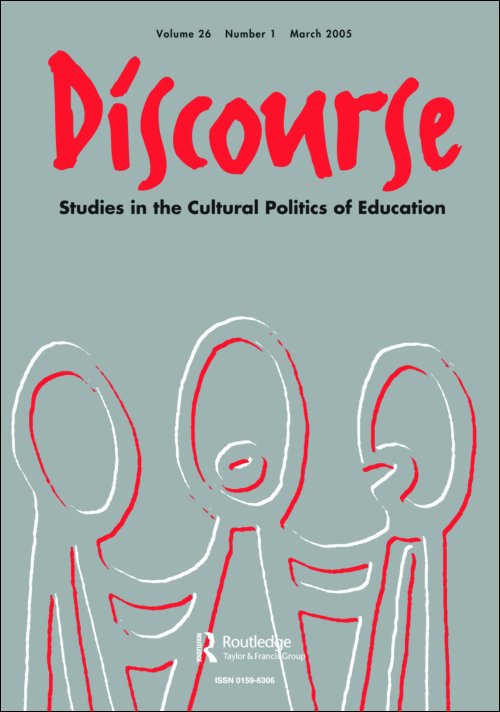
|
Re/producing the global middle class: International Baccalaureate alumni at ‘world-class’ universities in Hong Kong. Discourse: Studies in the Cultural Politics of Education, 1-15. https://doi.org/10.1080/01596306.2019.1573880
Abstract:
This research investigated educational pathways into a Global Middle Class characterised by professional or managerial careers and cosmopolitan sensibilities. The focus was International Baccalaureate Diploma Programme (IBDP) alumni with upper-middle-class backgrounds at ‘world-class’ universities in Hong Kong. The first objective was to investigate if and how the education of IBDP alumni at Hong Kong universities shapes self-perceptions of cosmopolitan sensibilities, university experiences, and economic futures. The second objective was to investigate how the IBDP and Hong Kong universities offer an educational pathway for the existing Global Middle Class to reproduce their social position and for local families to enter the Global Middle Class. Interview findings illuminated how cosmopolitan sensibilities meant that the students may be well-positioned for careers and lifestyles of the Global Middle Class. Nevertheless, there were paradoxes of cosmopolitan sensibilities as the students perceived a lack of belonging to their universities and a disconnection with the local society.
|
Bryant, D. A.,
& Rao, C.
 |
Teachers as reform leaders in Chinese Schools. International Journal of Educational Management. DOI: 10.1108/IJEM-12-2017-0371
Abstract:
Purpose – This paper analyzes the influence of teacher leadership on the enactment of educational reforms in southeastern China. It considers how the work of middle and teacher leaders in schools is structured to support reform enactment at the school level.
Design/methodology/approach – The research was conducted in three case study sites in one school district in Shenzhen, China. Low, moderate and high academic achieving schools which had engaged teacher leaders in instructional reforms were selected. A combined total of 34 senior, middle and teacher leaders participated in semi-structured interviews which were analyzed through a comparative coding process.
Findings – Across the three schools, teacher leaders without positional authority strongly influenced the instructional reforms. Their influence was strongest when bolstered by a combination of formal recognition systems, opportunities to lead projects that were directly related to the reform efforts, and mentorship systems that skilled novice teachers in reform-related skills and experienced teachers in leading reform enactment. Mechanisms and structures embedded in schools when coherently focused on selected reforms supported the efficacy of teachers without formal authority. And, middle leaders impact was enhanced when working collaboratively with formal and teacher leaders.
Originality/value – This research yields insight on teacher leaders’ influence of reform. It considers how the work of middle and teacher leaders can be structured as a collective that impacts on reform enactment at the school level. And, it illuminates teacher leadership in a Chinese context other than the scrutinized Shanghai school system.
|
Lee, M.,
Walker, A.,
& Bryant, D.
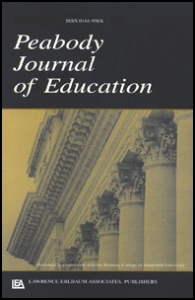
|
What leadership practices are associated with International Baccalaureate (IB) student achievement: An exploratory study of IB schools in Southeast Asia. Peabody Journal of Education. https://doi.org/10.1080/0161956X.2018.1515831
Abstract:
This article explores what leadership practices are associated with International Baccalaureate (IB) student achievement. Using a combined data set of Diploma Program (DP) exam scores and teachers’ survey responses about school leadership from 29 schools in Southeast Asia, the article reports certain leadership practices (i.e., strategic resourcing, monitoring classroom teaching and curriculum, encouraging teacher learning and development) exercised in the sampled IB schools that are significantly associated with student academic outcomes. This article contributes to empirical literature on school leadership effects on student learning in international school settings, which is an underresearched inquiry in the field. |
Walker, A.,
& Lee, M.

|
Weaving curriculum connections in International Baccalaureate (IB) schools. Peabody Journal of Education. https://doi.org/10.1080/0161956X.2018.1515837
Abstract:
In this article we discuss how school leaders address challenges when implementing innovative international education curricula, namely International Baccalaureate (IB) programs. Specifically, we frame challenges in curriculum implementation of and transition between IB programs from a “disconnection” perspective. We have often noticed when innovative programs are parceled together without preparation and thrust at great speed at schools, they become disconnected. The hasty implementation of multiple IB programs simultaneously at a school also causes disconnection. Drawing on extensive interview data from principals, mid-level leaders, and teachers in five IB schools adopting multiple IB programs in Asia, we detail curriculum disconnection facing IB schools and how school leaders, including teacher leaders, address such challenges by weaving various disconnected points, namely instrumental, intellectual, cultural, professional, and communicative disconnections. Based on findings from the multisite case study, we argue that school leaders in the case of IB schools adopt a range of leadership strategies to weave disconnection points. We reframe the leadership strategies as two aspects of distributed leadership: distributed instructional leadership and teacher leadership. In conclusion, we suggest that a central facet for successful leadership of IB schools that adopt multiple IB programs is about finding, focusing, and facilitating ways to address disconnections in curriculum implementation of and transition between different IB programs.
|
Cheng, A. Y. N.,
& Szeto, E.
 |
Changing Hong Kong university students’ national identity through studying abroad. Asian Education and Development Studies, https://doi.org/10.1108/AEDS-05-2017-0045
Abstract:
Purpose – The purpose of this paper is to explore whether there are any effects on Hong Kong university students’ national identity after short-term study abroad. If so, what sources of influence from the short-term study abroad programme contribute to the students’ change in national identity?
Design/methodology/approach – Using the case study approach, 85 students completed a questionnaire, and a small group of 12 students were invited to individual interviews for further investigation.
Findings – Results show that the students’ perceptions of national identity are multiple and complicated through the lens of four components of national identity. The responses of students’ perceptions of change in identity were pointed to three statements: “feeling prouder of being Chinese”, “Hongkongers are very different from mainland Chinese” and “no change in my views of national identity”. The influences of study abroad experiences on national identity varied, dependent on the students’ interaction with the local and non-local people, and reflection on their own identity, whether on the cultural or political differences or on national achievements.
Research limitations/implications – The findings of this study can inform educators and administrators to enhance profound short-term study abroad experience for the students. The limitation of this case study is that it is concerned with understanding how small numbers of students construct meaning from their individual experience. It is recommended that studies with larger sampling sizes be conducted to investigate students’ perceptions of their national identity before and after studying abroad.
Originality/value – Considering the increasing number of Hong Kong youths who have participated in these short-term study-abroad programmes in higher education, the findings of this study are significant in terms of awakening the students’ taken-for-granted national identity, if any. The programme serves as a means of triggering the students’ feelings and emotions regarding their identity in different national, social and cultural contexts. This can inform policy makers, educational administrators and teachers to formulate an appropriate national education curriculum for the youth.
|
Szeto, E.,
& Sin, K. K. F.
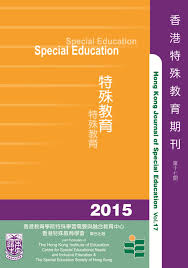 |
Career and life planning education policy: What are teachers’ experiences of supporting student career development in the diverse school setting? Hong Kong Journal of Special Education, 20, 36–52. |